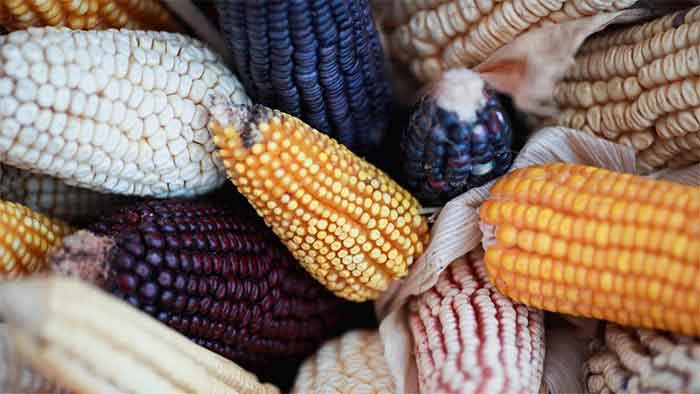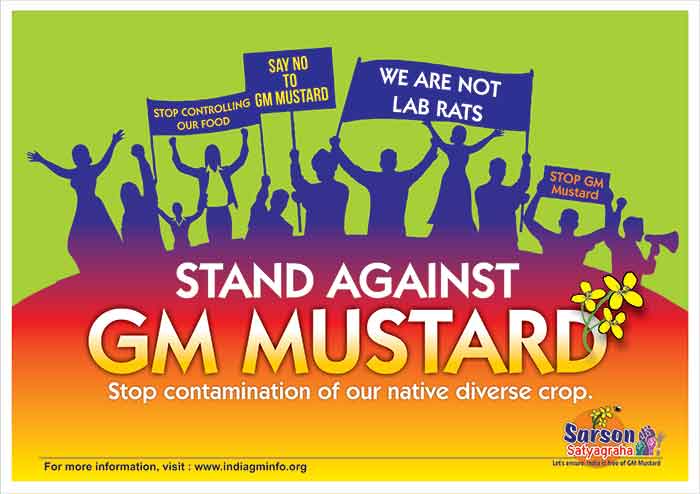
The government and people of Mexico have been involved in a struggle for several years to protect their staple food corn from serious health and environmental hazards linked strongly with imports of GM (genetically modified) corn and contamination of local corn with GM corn. However they and their protective efforts face the deep opposition of their neighbor and superpower the USA. In saving these protective efforts from the onslaught and threats of the superpower the government and people of Mexico need worldwide support, particularly from farmers’ movements, health and environmental movements as this is a very important struggle for all. Important stakes are involved for the health and environment and for all of humanity, and indeed for all forms of life, as Mexico has become the most important country for the struggle against GM crops (although of course the struggle in other countries like India is also very important).
Some Mexican groups and organizations with roots in rural and indigenous communities have shown widely appreciable clarity and deep understanding of this important issue of increasing concern to people and farmers all over the world. To give an example, one organization “Red en defense del Maiz’ has stated very clearly, “ We once again reject any experimental, pilot or commercial planting , distribution, storage or marketing of genetically modified organisms (GMOs) anywhere on the nation’s territory ( or indeed, anywhere in the world).”
While the government of Mexico in recent years has been taking very commendable steps in opposing import of GM corn from USA, its position on this issue has not been equally strong compared to some grassroots organizations. The government is opposed to import of GM white corn most directly used for human consumption but not so much to import of yellow ‘industrial’ GM corn despite the fact that industrial use my include use in processed food and multinational companies may mix GM and non-GM corn. The Mexican government also has to worry about very heavy opposition from the USA where the GM agribusiness lobby is fully supported by the USA government. Even a tariff increase on white corn import, despite the self-sufficiency Mexico has in this, can lead to much unjustified pressure from across the border, as has been seen recently and earlier too. This is why wider support from all over the world for Mexican government is so much needed today in its efforts to protect food safety and sovereignty.
One reason for excessive constraints faced by the Mexican government relates also to the trade agreements it has entered at regional level involving the USA and Canada– NAFTA followed by USMCA. What has been observed in Mexico should be a lesson for other governments including India regarding how unjust and unequal trade agreements can become a big hurdle in such crucial domestic areas as protection of food safety. Provisions of trade agreements and their interpretation have been used in such a way as make it more and more difficult for Mexico to protect as crucial an interest as its food safety.
As many senior scientists have warned, there are very serious health hazards associated with the consumption of GM crops as food and with the use of herbicides like glyphosate which are used as a part of a package for growing some of these crops. When it could not altogether avoid import of GM corn, Mexico tried to reduce these health hazards by diverting a lot of the imported corn to industrial use and to feeding animals. But one way or the other, through meat or dairy food consumption or processed food for example, GM corn would still enter the food chain and health hazards would be there. Also imported GM corn could not be kept away entirely from direct consumption, or from bring mixed with non-GM corn by tortilla (staple food of Mexico) factories as it was much cheaper.
An even bigger concern for Mexico was to save Mexican agriculture and its local varieties from genetic contamination caused by GM crops. So attempts were made to prevent imported GM corn from being used as seed. But even these efforts could not succeed entirely and there were reports of risks of genetic pollution caused to some extent. However grassroots organizations have worked hard to avoid genetic contamination and as a result of their efforts the harm could be contained and reduced.
The Mexican government has at times come under a lot of pressure from multinational agribusiness lobbies. The multinational companies also tried to foster a strong GM lobby to support them within Mexico and also kept sounding their supporters in the US administration for support.
While on the one hand there were growing apprehensions regarding great risks to Mexican farming and food system, on the other hand there were trends towards revised trade agreements which would make it even more difficult to restrict genetically modified and gene edited crops and seed patenting.
In these disturbing conditions social and political mobilization for protection of food and farming systems grew. The present government led by President A.M.L. Obrador has been committed to this as part of the promises made to people.
It is heartening that several public interest groups in the USA have come to the support of the Mexican government and people. In a letter as many as about 80 such US groups (representing important sectors like public health, agriculture, consumer protection and environment) have written to key officials in the Biden Administration asking them to “ respect Mexico’s sovereignty and refrain from interfering with its right to enact health-protective policies , specifically to phase out the herbicide glyphosate and the cultivation of genetically modified corn.”
While the Mexican government certainly deserves wide support from all over the world in its protective policies, internal reforms to strengthen grassroots organizations and rural communities is also need to strengthen the base of domestic protective effort. As a statement of the organization Red en defensa del Maiz has rightly asserted, “We reaffirm that the defense of corn in Mexico is necessarily bound up with respect for the self-determination and autonomy of the country’s indigenous and peasant communities and people.”
Bharat Dogra is Honorary Convener, Campaign to Save Earth Now. His books include ‘Planet in Peril’, ‘India’s Quest for Sustainable Farming and Healthy Food’, ‘14 Questions about GM Crops’ as well as its Hindi version.













































